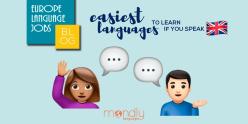"How many languages do you speak?"
I’ve lost count of the times I’ve heard this question. The more languages I learn the harder it is for me to answer. Because of how many languages do I speak? I am not sure. The truth is I’m not really sure what 'speaking' a language means.
When I reply saying that I speak 6.5 languages, people often laugh. "How can you speak half a language?" they ask, but the question I ask myself is, how can you speak a whole language? What is that point that you say "I speak my mother tongue but I also speak another language that I learned"?
I mean, how on earth could you ever compare the knowledge of a lifetime of daily practice of your native language, to a language you have learned for a considerably shorter time? I say that I speak 6.5 languages but in reality, the number is not even measurable.

Photo: Unsplash
Language as a binary concept
Many people consider language to be a binary thing: you either speak a language or you don't. But the truth is that language is everything but binary. There are an infinite number of levels of ability for a language, different shades and depending on what you feel is important you have to judge yourself and come up with an answer: do you speak the language or not?
Literally you could 'speak' whatever language you please. You can say any word in Swahili, and that would mean that you are literally speaking Swahili. This is usually not what people mean when they ask you if you 'speak' a language.
To them speaking a language means mastering it, being able to speak with a certain fluency, follow what is being said when people talk in the language in question. In reality, speaking a language also means being able to read it.
Another thing to keep in mind with language is the level to which someone speaks it. Many native speakers who are technically ‘fluent’ will probably not reach the point where they can read/write/talk on an academic level. But what about international professors that give academic lectures but who are unable to understand expressions people use in their everyday lives?
Is a native child more or less fluent in a language than someone who has been learning it for many years but still has an accent? Apparently there isn’t one Chinese person who knows every Mandarin character.
Does that mean they don't speak their language fluently?
Modesty
Whether or not you speak a language usually depends on the individual but also what country you grew up in. Those who grow up in a country where only one language is spoken and taught, are swift to claim that they speak another language, even when they only know a couple of words or phrases.
People from countries with several official languages (and therefore speak multiple languages at at least a proficient level) will often compare themselves to native speakers when they learn a second language. They probably won’t count it as a language they speak if they do not feel totally comfortable in it, even if they have a good basic knowledge of the language in question.

Photo: Unsplash
I remember one of my friends from the U.S. who was visiting me in the Netherlands asked me:
"Why does everybody I ask say they speak a little English when they actually speak very well?"
This made me laugh because it's absolutely true. Most people in the Netherlands speak English really well. Some better than others, of course, but for a country that is not officially bilingual you can get by surprisingly well without speaking any Dutch. But the standard to which they measure English is different from the standard to which, for example, Americans measure their knowledge of Spanish.
The Scale of Language Ability
There are countless gradations for language ability and when people question if you speak a language it makes you evaluate and question yourself. This is one thing that I don't like to do.
By no means am I a perfectionist when it comes to anything. I don't like exact answers, I am not a fan of numbers and in general, I’m not a particularly precise person. However, when it comes to languages, I have been known to beat myself up over small things such as grammar mistakes.
Something that I later realised wasn't perfect, can haunt me for much longer than I wish to admit. The one thing saving me from this curse is extreme laziness which helps me avoid actually learning the things that I know I don’t know, such as vocabulary, grammatical structures and expressions.
And yet the perfectionist inside me is revealed when the question "How many languages do you speak?¨ reappears.
This is due to the fact that I feel like a fraud for including the languages that I do not dominate 100% in my list. This is a bitter pill to swallow because I often feel that juggling four languages a day makes means that I fail in all of them, including my mother tongue.

Photo: Unsplash
That question again...
I remember one time someone asked me how many languages I spoke, and I explained to him why I thought it was such a difficult question to answer. I asked if he could be more specific about what he considered 'speaking' a language was.
He said "Any language you know at least one or two words in¨. Umm, do you have a minute?
As a former exchange student in many countries, I have accumulated an extensive vocabulary of random words and phrases I will probably never use (as most of them are maybe not so appropriate, that could be a good thing).
At the other end of the scale, some people only want to hear about the languages that you speak fluently. The likelihood is that most people haven’t thought about the scale of 'speaking' a language. They probably never realised that it isn't a black and white concept but that there are numerous grey areas in between.
Personally, I feel that more people should discover this truth. Many of you who have already started learning another language will know that the cruel reality is that there is no finish line.
There is no point where you stop and triumphantly say to yourself, ¨Now I 100% dominate this language". Milestones and finish lines only exist for you personally to be satisfied with, but knowing a language completely is impossible – even for natives.
Instead of chasing unachievable goals of language learning and thinking of language as a binary concept where we either speak it or not, we should embrace the nuances as we shift subtly between the endless shades of grey.
Today’s guest blog comes to us from The Hague-based, Amarens. She is an avid blogger, a travel enthusiast and a true language expert!
Original version published on www.nationalityunknown.com






Sergii Pivnov1y ago
multi languages is a must in current over-saturated labor market with general specialties, when everybody trying to to make all thing, and trick is not to try but make right here & now without attempts but with 120% success
multi languages is a must in current over-saturated labor market with general specialties, when everybody trying to to make all thing, and trick is not to try but make right here & now without attempts but with 120% success